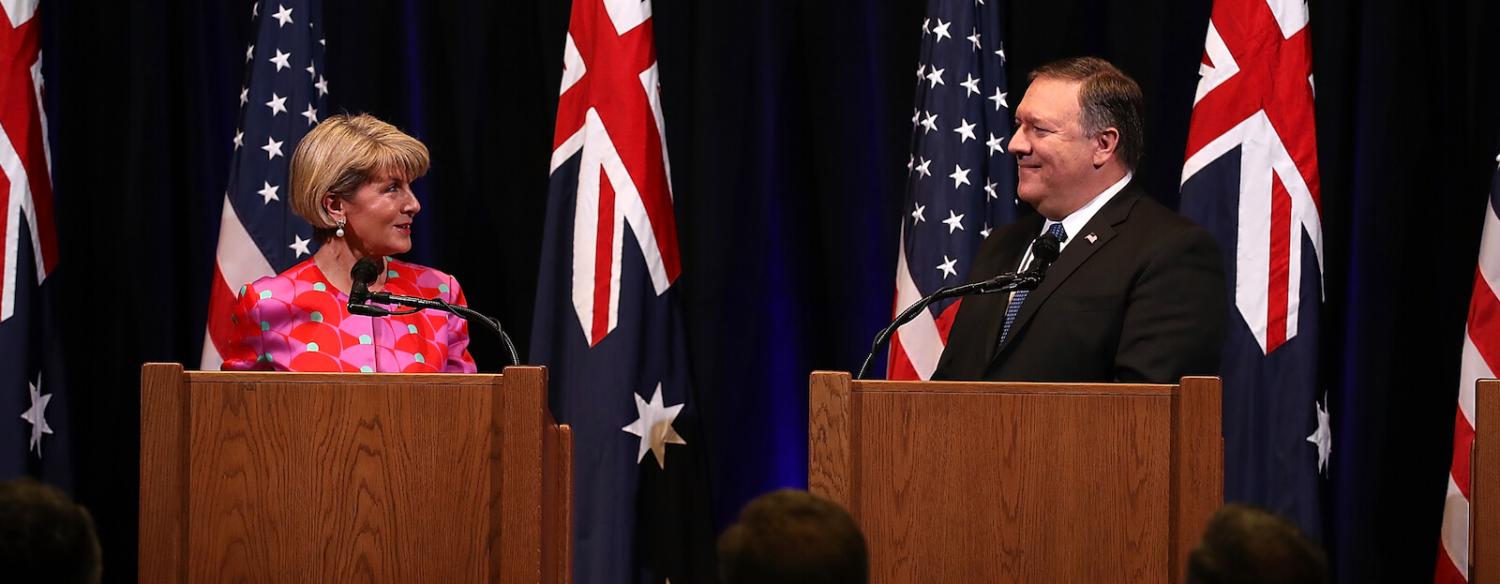The week that was on The Interpreter.
On Tuesday, Australian Foreign Minister Julie Bishop announced a trilateral infrastructure partnership between Australia, Japan, and the US. Jonathan Pryke and Richard McGregor:
Despite neither Bishop nor US Secretary of State Mike Pompeo mentioning China, the proposal was immediately framed by commentators and the media as a counter to Beijing’s Belt and Road Initiative (BRI). For the three countries, this characterisation of their plan is as unsurprising as it is dangerous. Without significant resources behind it, the initiative runs the risk of looking like an attempt to challenge China, and falling well short in the process.
India has seen a spate of mob lynchings triggered by rumours shared on the the communication application WhatsApp. Niraja Gopal Jayal:
It does not seem to be sufficiently appreciated that the internet or WhatsApp are not the cause of mob violence, although they facilitate the spreading of fake news or rumours.
Chinese President Xi Jinping has been using the term “rule of law in international relations” to describe his vision for the interaction between states. Simone van Nieuwenhuizen:
In its 2017 national statement at the UN General Assembly, China argued that the UN should ‘follow current trends and work to make international relations more … rule-of-law-based’. It is interesting to note that the English version in fact mistranslated ‘rule-of-law-based’ as ‘rules-based’. While ‘rules-based international order’ is familiar to Australia and its partners, China tends not to refer to international relations or the international order as ‘rules-based’, except in reference to the World Trade Organisation.
Katharine Woolrych and Jon Fraenkel on New Zealand’s evolving development policy in the Pacific:
One thing that may appear to have changed is the New Zealand government’s intention to focus on Melanesia and parts of Micronesia. The traditional orthodoxy describes Australia as taking responsibility for Melanesia, while New Zealand takes the lead in Polynesia. New Zealand Foreign Minister Winston Peters has frequently emphasised the political, cultural, and historical links that connect New Zealand and Polynesia. Yet on closer examination, this is not such a radical break with the past.
Last week former Pakistani fast bowler Imran Khan was elected Prime Minister of Pakistan. Mohib Iqbal:
In his first address to the nation, Khan emphasised his naya, or new Pakistan strategy. His anti-corruption rhetoric promotes the establishment of an Islamic-style welfare state and advances a strong nationalistic agenda that appeals to the military as well as younger generation of educated Pakistanis. On foreign policy – an area in which he might not have much leverage, given the military tends to control international affairs regardless of who is in power – Khan promised to further strengthen relations with China, and wants a mutually beneficial relationship with the US.
Robert Kelly on the human rights record of South Korean President Moon Jae-in:
Moon, with his seriousness, professionalism, sunny disposition, and obvious enthusiasm for the job, is a breath of fresh air. His approval rating is still quite high. But Moon has been surprisingly poor on human rights, an issue traditionally dear to centre-left parties and of particular importance to this president.
As part of their promise to repatriate the remains of US soldiers killed in the Korean War, North Korea delivered 55 boxes of bones and one military dog tag to US authorities this week. Meghan Fitzpatrick:
Regional observers have also expressed concern that the North Koreans are simply using repatriation as a bargaining chip in negotiations with the US. And there is evidence to suggest this may be the case. Before relations between the two countries soured, North Korea extracted nearly $28 million from the US for previous joint recovery efforts, conducted from 1996 to 2005.
Comments from New Zealand Deputy Prime Minister Winston Peters have stirred up suggestions of a trans-Tasman rift. Rob Ayson:
Different domestic paradigms are at work here. New Zealanders complain about reciprocity and fairness: this is not how they would treat Australian nationals living in New Zealand. And New Zealand ministers have been arguing this case predominantly through the lens of human rights and the rule of law. Canberra’s lens has been national security and law and order.
Julie Bishop also took her first official visit to Timor-Leste this week. Sophie Raynor:
For Bishop, it is unclear how the promised ‘new chapter’ will be realised without recognition of Australia’s past wrongdoing and release of the handbrake that remains on Timor-Leste’s economic development as a result Greater Sunrise’s gridlock.
Recent advances in surveillance technology have manifested in very different ways in different countries. Mark Briskey:
Clearly we must strike a balance: we should use technology where it presents clear benefits to the public good, but the public should be well informed and has a right to be wary of government guarantees on privacy. We have been asked give it up with only glib assurances on data security.
Melissa Conley-Tyler on the different definitions of the “rules-based international order”:
Who is the challenger? This divides those that are more focused on the order – the US-led strategic status quo – versus those who are more focused on the rules and the maintenance of orderly relations. The former sees non-Western powers as the threat; the latter are more focused on the US.
Dirk van Graver on the challenges governments face in managing and rehabilitating prisoners convicted of terrorist offences:
Islamic State has weaponised social media to encourage and facilitate the planning and logistics of terrorism. As a result, evaluating the danger a convicted terrorist presents to the community is highly complex. In the foreseeable future, we can expect to see new restrictions on convicted terrorists at the end of their custodial sentence.
